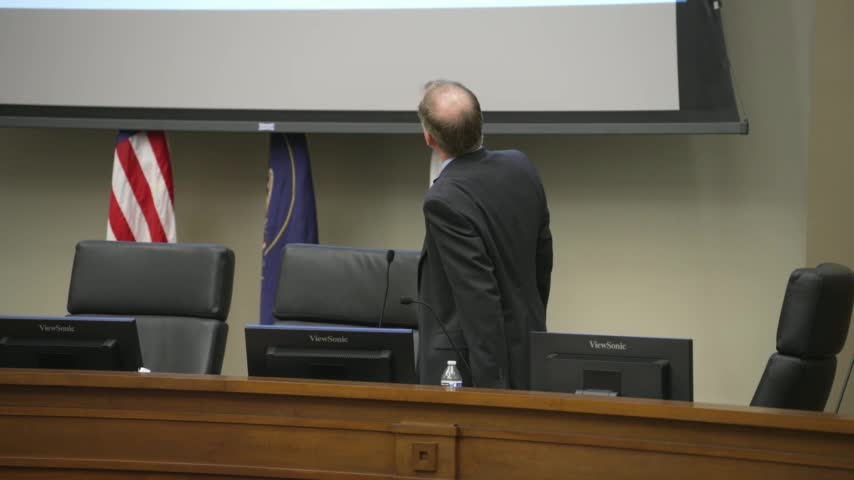Putin's NATO Aspirations and Biden's Ukraine Strategy Analyzed in Recent Webinar
November 16, 2023 | Other , Citizen Journalism , 2024 -2025 Utah Citizen Journalism, Elections, Utah
This article was created by AI summarizing key points discussed. AI makes mistakes, so for full details and context, please refer to the video of the full meeting. Please report any errors so we can fix them. Report an error »

In a recent government meeting held in Highland, Utah, discussions centered on the complex geopolitical landscape involving Russia, Ukraine, Israel, and Taiwan, with a particular focus on the implications of U.S. foreign policy. David Pyne, a key speaker, provided a historical overview of Russia's relationship with NATO, highlighting that leaders from Gorbachev to Putin had expressed interest in joining the alliance. This perspective challenges the common narrative of Russia as a perpetual adversary of the West.
Pyne explained that after the Cold War, Russia initially pursued a strategy of convergence with the West, seeking economic and military collaboration. However, he noted that this approach shifted dramatically following NATO's expansion into Eastern Europe and the U.S. military interventions in the Balkans, which he argued were perceived as provocations by Russia. The 2008 Bucharest declaration, which indicated NATO's intention to include Ukraine and Georgia, marked a turning point that led to increased tensions and Russia's military actions in Georgia and later Ukraine.
The discussion also touched on the 2014 Ukrainian coup, which Pyne claimed was backed by the CIA and further escalated the conflict, leading to Russia's annexation of Crimea. He criticized the Biden administration's handling of the situation, suggesting that the rejection of a proposed mutual security pact from Russia was a missed opportunity for peace. Pyne characterized the ongoing conflict in Ukraine as "Biden's war," arguing that U.S. actions have exacerbated tensions and increased the risk of nuclear escalation.
In addition to the focus on Ukraine, the meeting addressed broader implications for U.S. foreign policy, particularly regarding military aid to Ukraine and its potential consequences for global security. Pyne warned that the risk of nuclear escalation had significantly increased, raising concerns about the safety of American citizens.
The meeting underscored the need for a nuanced understanding of international relations and the potential repercussions of U.S. foreign policy decisions. As tensions continue to rise in various regions, the discussions highlighted the importance of diplomatic engagement and the potential for conflict resolution through dialogue rather than military intervention. The outcomes of these discussions may influence future policy directions as the U.S. navigates its role on the global stage.
Pyne explained that after the Cold War, Russia initially pursued a strategy of convergence with the West, seeking economic and military collaboration. However, he noted that this approach shifted dramatically following NATO's expansion into Eastern Europe and the U.S. military interventions in the Balkans, which he argued were perceived as provocations by Russia. The 2008 Bucharest declaration, which indicated NATO's intention to include Ukraine and Georgia, marked a turning point that led to increased tensions and Russia's military actions in Georgia and later Ukraine.
The discussion also touched on the 2014 Ukrainian coup, which Pyne claimed was backed by the CIA and further escalated the conflict, leading to Russia's annexation of Crimea. He criticized the Biden administration's handling of the situation, suggesting that the rejection of a proposed mutual security pact from Russia was a missed opportunity for peace. Pyne characterized the ongoing conflict in Ukraine as "Biden's war," arguing that U.S. actions have exacerbated tensions and increased the risk of nuclear escalation.
In addition to the focus on Ukraine, the meeting addressed broader implications for U.S. foreign policy, particularly regarding military aid to Ukraine and its potential consequences for global security. Pyne warned that the risk of nuclear escalation had significantly increased, raising concerns about the safety of American citizens.
The meeting underscored the need for a nuanced understanding of international relations and the potential repercussions of U.S. foreign policy decisions. As tensions continue to rise in various regions, the discussions highlighted the importance of diplomatic engagement and the potential for conflict resolution through dialogue rather than military intervention. The outcomes of these discussions may influence future policy directions as the U.S. navigates its role on the global stage.
View the Full Meeting & All Its Details
This article offers just a summary. Unlock complete video, transcripts, and insights as a Founder Member.
✓
Watch full, unedited meeting videos
✓
Search every word spoken in unlimited transcripts
✓
AI summaries & real-time alerts (all government levels)
✓
Permanent access to expanding government content
30-day money-back guarantee


